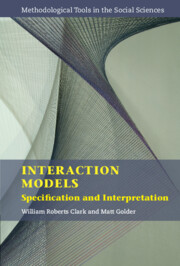
-
Select format
-
- Publisher:
- Cambridge University Press
- Publication date:
- 02 November 2023
- 16 November 2023
- ISBN:
- 9781108241762
- 9781108416719
- 9781108404082
- Dimensions:
- (229 x 152 mm)
- Weight & Pages:
- 1.043kg, 612 Pages
- Dimensions:
- (229 x 152 mm)
- Weight & Pages:
- 0.91kg, 612 Pages
- Subjects:
- Political Theory, Research Methods in Politics, Research Methods in Sociology and Criminology, Research Methods In Sociology and Criminology, Statistical Theory and Methods, Politics and International Relations, Research Methods In Politics, Sociology
You may already have access via personal or institutional login- Subjects:
- Political Theory, Research Methods in Politics, Research Methods in Sociology and Criminology, Research Methods In Sociology and Criminology, Statistical Theory and Methods, Politics and International Relations, Research Methods In Politics, Sociology
Book description
The radical interdependence between humans who live together makes virtually all human behavior conditional. The behavior of individuals is conditional upon the expectations of those around them, and those expectations are conditional upon the rules (institutions) and norms (culture) constructed to monitor, reward, and punish different behaviors. As a result, nearly all hypotheses about humans are conditional – conditional upon the resources they possess, the institutions they inhabit, or the cultural practices that tell them how to behave. Interaction Models provides a stand-alone, accessible overview of how interaction models, which are frequently used across the social and natural sciences, capture the intuition behind conditional claims and context dependence. It also addresses the simple specification and interpretation errors that are, unfortunately, commonplace. By providing a comprehensive and unified introduction to the use and critical evaluation of interaction models, this book shows how they can be used to test theoretically-derived claims of conditionality.
Contents
Metrics
Altmetric attention score
Full text views
Full text views help Loading metrics...
Loading metrics...
* Views captured on Cambridge Core between #date#. This data will be updated every 24 hours.
Usage data cannot currently be displayed.
Accessibility standard: Unknown
Why this information is here
This section outlines the accessibility features of this content - including support for screen readers, full keyboard navigation and high-contrast display options. This may not be relevant for you.
Accessibility Information
Accessibility compliance for the PDF of this book is currently unknown and may be updated in the future.


